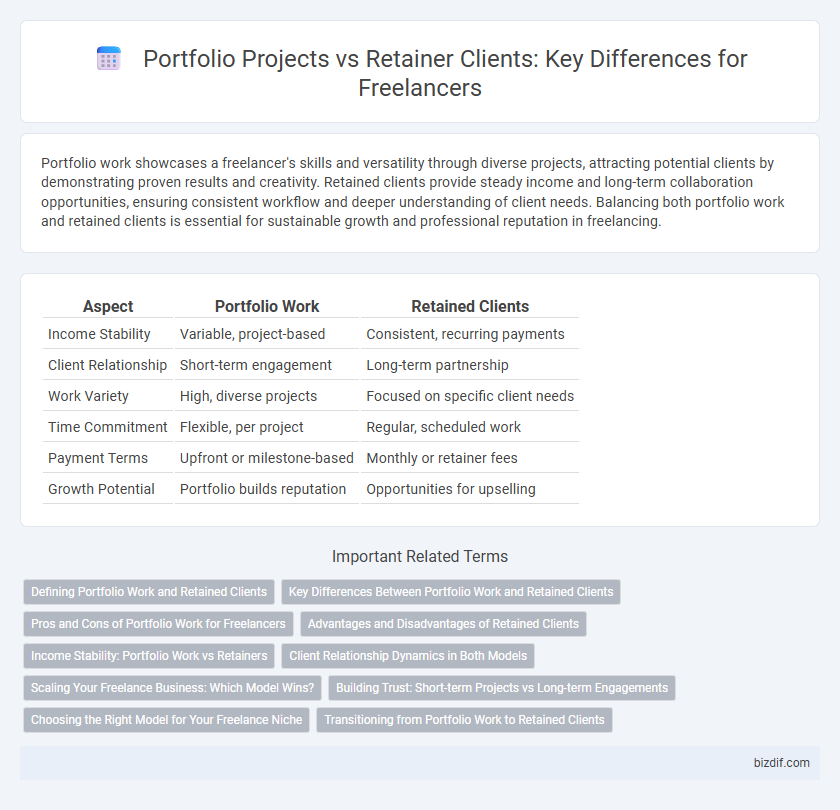Portfolio work showcases a freelancer's skills and versatility through diverse projects, attracting potential clients by demonstrating proven results and creativity. Retained clients provide steady income and long-term collaboration opportunities, ensuring consistent workflow and deeper understanding of client needs. Balancing both portfolio work and retained clients is essential for sustainable growth and professional reputation in freelancing.
Table of Comparison
| Aspect | Portfolio Work | Retained Clients |
|---|---|---|
| Income Stability | Variable, project-based | Consistent, recurring payments |
| Client Relationship | Short-term engagement | Long-term partnership |
| Work Variety | High, diverse projects | Focused on specific client needs |
| Time Commitment | Flexible, per project | Regular, scheduled work |
| Payment Terms | Upfront or milestone-based | Monthly or retainer fees |
| Growth Potential | Portfolio builds reputation | Opportunities for upselling |
Defining Portfolio Work and Retained Clients
Portfolio work consists of completed projects showcased to demonstrate skills and expertise, often attracting new clients and building credibility. Retained clients engage freelancers on an ongoing basis through long-term contracts or recurring services, providing steady income and stable professional relationships. Balancing portfolio work and retained clients enables freelancers to diversify income streams and maintain consistent workflow.
Key Differences Between Portfolio Work and Retained Clients
Portfolio work showcases a freelancer's diverse skills and completed projects, serving as a tangible evidence of expertise to attract new clients. Retained clients provide ongoing, steady revenue streams through long-term contracts, fostering deeper professional relationships and consistent workload. The key differences lie in the portfolio's role as a marketing tool versus retained clients' function in generating sustained income and job security.
Pros and Cons of Portfolio Work for Freelancers
Portfolio work allows freelancers to showcase diverse skills across multiple projects, enhancing their marketability and attracting varied clients. However, it often entails inconsistent income and increased time spent on client acquisition compared to the steady revenue from retained clients. Balancing portfolio projects with ongoing client relationships can optimize both creative freedom and financial stability.
Advantages and Disadvantages of Retained Clients
Retained clients provide freelancers with consistent income and long-term project stability, enhancing cash flow predictability and fostering deeper professional relationships. However, reliance on retained clients may reduce flexibility, limit exposure to diverse projects, and increase dependency risk if the client relationship ends abruptly. Balancing retained clients with portfolio work helps mitigate these disadvantages while maintaining steady revenue streams.
Income Stability: Portfolio Work vs Retainers
Freelancers relying on portfolio work often face fluctuating income due to project-based payments and inconsistent client flow. Retained clients provide a steady revenue stream through ongoing contracts, enhancing financial stability and enabling better long-term planning. Balancing portfolio projects with retainer agreements helps diversify income sources and reduce the risk of income volatility.
Client Relationship Dynamics in Both Models
Portfolio work showcases a freelancer's range and versatility, attracting diverse projects but requiring constant marketing and new client acquisition. Retained clients provide steady income and deeper collaboration, fostering trust and long-term strategic alignment essential for sustained success. Understanding client relationship dynamics in both models helps freelancers balance project variety with financial stability and growth opportunities.
Scaling Your Freelance Business: Which Model Wins?
Scaling your freelance business hinges on choosing between portfolio work and retained clients, where portfolio work offers diverse project experience but inconsistent income, while retained clients provide steady cash flow and long-term relationships critical for growth. Retained clients enhance financial stability and enable predictable revenue forecasting, essential for strategic scaling and team expansion. Balancing both models optimizes growth by leveraging portfolio diversity for skill development and retained contracts for sustainable income streams.
Building Trust: Short-term Projects vs Long-term Engagements
Portfolio work showcases diverse skills through completed short-term projects, attracting prospective clients by demonstrating expertise and versatility. Retained clients provide ongoing opportunities, fostering deeper trust and establishing long-term professional relationships that lead to steady income and collaborative growth. Balancing both approaches enhances reputation and ensures sustained career development in freelancing.
Choosing the Right Model for Your Freelance Niche
Freelancers must evaluate their niche demands to decide between portfolio work and retained clients, as each model impacts income stability and workload management differently. Portfolio work showcases diverse skills and attracts varied projects but often leads to inconsistent cash flow. Retained clients provide predictable revenue through ongoing contracts, ideal for niches requiring continuous support and deep client relationships.
Transitioning from Portfolio Work to Retained Clients
Transitioning from portfolio work to retained clients requires demonstrating consistent value and reliability through completed projects that align with client needs. Building strong relationships and establishing clear communication fosters trust, encouraging long-term collaborations and steady income. Leveraging a robust portfolio as proof of expertise accelerates securing retainers, shifting focus from one-off assignments to sustainable client partnerships.
Portfolio Work vs Retained Clients Infographic

 bizdif.com
bizdif.com